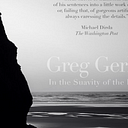On a Sentence from Guy Davenport’s “The Artist as Critic”

Guy Davenport — from the essay “The Artist as Critic” in the book Every Force Evolves a Form
“She is a Brechtian soul, foulmouthed, deep-dyed in sin and dirt.”
The three central essays of Davenport’s book (“The Artist as Critic,” “The Scholar as Critic,” and “The Critic as Artist” were read as lectures 1985 at Washington and Lee University and published in Shenandoah. I’ve always been fascinated by them: for the territory they cover, for the lessons they unpedantically push, for their style and smooth talk (grammar and syntax), both unsentimental and lyrical. Here, Davenport is “tracking literary descent.” The subject is Yeats’s Crazy Jane character and his seven poems about her. Davenport’s first descriptive sentence to touch her is like a long line of exquisite verse. Even if we slough off “Brechtian,” not entirely sure what that adjective means (didacticism), we have the rest of the utterance to bolster this character and make us meet her in an almost Yeatsian line, sinewy and full of short words, short vowels. Three “ou”s carry the first part of the declaration leading into “foulmouthed,” which kind of acts as an extended connector with a caesura at the termination of the word, before the sentence bores into the triumphant “deep-dyed in sin and dirt,” an incredible concoction — an end with three d-words and a bevy of “I”s in “in sin and dirt.” But I would also suggest that this compacted and vibrant line is a microcosm of the essay itself: “The Artist as Critic.” Davenport is both. Just before this, he wrote, “Art, as Harry Levin has said, and with much brilliance shown, is its own historian. It is also its own critic.” If art is its own critic and historian, criticism is its own art, as well. In “The Critic as Artist,” he writes:
Ezra Pound here, Hugh Kenner there: and we see something we had not seen before. Professor Kenner, left to his own devices, writes about mathematics and geodesic tensegrities, or discourses on Canada or God. Ezra Pound writes poetry. Put the two together, and an unsuspected system of subjects emerges bright and clear.
In effect, all criticism is deeply personal, some critics might not write about their lives, but they’ll write about what they know — is there a difference? Davenport writes of Crazy Jane like she was his sister and he uses all his tools to outfit the portrait, ancillary to Yeats’s carefully wrought lines. Perhaps this is why I prefer to read great criticism while I’m reading a work (Deleuze and Shattuck on Proust during the read), but when I get to the end, the need to explicate more leaves off. I want them side by side, because then I am getting that third thing, as an “unsuspected system of subjects emerges.” It’s not as if that the ending mitigates more criticism, it’s just that the text as it is lives in my mind more freely when in process.
Davenport writes “Literature does not ever say anything. It shows. It makes us feel. It is, in the world’s language, as inarticulate as music and painting. It is critics who can tell us what they think it means.” The essence of the Davenportian method is this — he shows. Literature makes him feel that all the arts are connected into an ever-expanding and ever-shifting root system and he promotes this. He did read into Eudora Welty (and Grant Wood before her) what she claimed was not there, but he had a clipping response to this: “Miss Welty…seeing her stories…always perforce inside outwards, does not realize the extent she has kept the contours and symbols of Ovid…that we can see from the outside looking in” and, for Wood, “…the painting knew these things for him.” Davenport’s brand of impressionism is all proto-Kennerian, where that “unsuspected system of subjects” comes out, deep-dyed in culture and philological glimmerings. The least sentence of Davenport, of which the above might seem like one, typifies the method.
